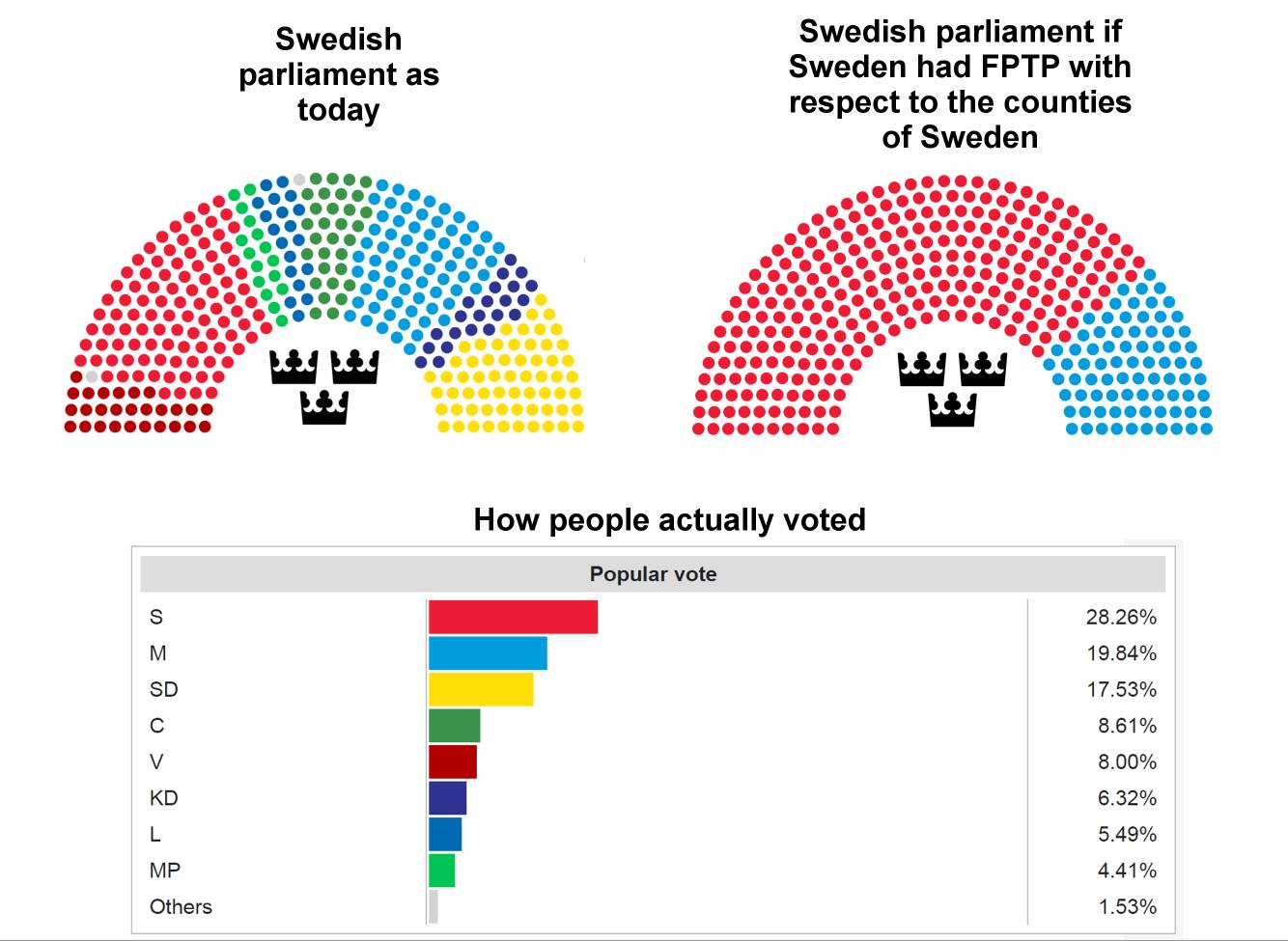I’m hearing alot about the structural flaws of First past the post voting these days. Glad to see more people talking about the topic. Let’s start making plans to fix this once and for all so people are free to vote how they want.
I voted for Oregon Measure 117 which will institute Ranked Choice Voting statewide in all elections.
Same here.
Oregon is the best.
We got RCV on the ballot in my village this year. Starting there.
Please do a post on how it goes. Lemmy know ;)
Saving the post now for an update. The results will probably take a while, the local stuff always does.
It passed! We 20,684 yes votes to 5,436. Over half of all registered voters in the village voted yes. We are only the second municipality in our state.
Awesome! Let me know how it works out next election that uses it or whatever
Last election my city passed rank choice voting, this election its being voted on state wide and will hopefully pass.
Which state?
Oregon
Another interesting fact relating to the presidential elections
States are slowly making a pact, once enough of them are on board; fuck the electoral college. Whoever wins the national vote, gets the “states’” vote.
CPP Gray: https://youtu.be/tUX-frlNBJY
I can’t see the red states ever getting on board with this, since the only way they’ve ever won is via the college and not the popular. They would be resigning their historical preference (based on history of the vote). Am I wrong? This seems to me to be how it stands.
Republicans are legislating to protect First Past the Post voting. Florida already has banned Ranked Choice voting (but there are many other voting systems we could use).
So why haven’t the democrats passed electoral reform in states they control? Why do they want to continue using the voting system republicans prefer? Isn’t the republicans liking something a ultragigagigantic red flag?
Removed by mod
I hope they succeed!
I’m pushing for the 127 DC States plan, https://www.vox.com/2020/1/14/21063591/modest-proposal-to-save-american-democracy-pack-the-union-harvard-law-review , wherever I can. Getting this through successfully is probably the best chance to replace FPTP at the national level, including for Presidential elections.
Well, that is the wildest thing I read
in a long timesince the last Trump news, but it is actually very interesting. And constitutional. America is wild.America is wild! https://en.wikipedia.org/wiki/Texas_divisionism Texas maybe legally has the right to choose to just divide itself into 5 states at any time
Texas being Texas, I guess ¯\_(ツ)_/¯
Well, my province made it illegal for cities to decide to use anything other than FPTP.
The province is likely to elect the same leader because we have a 30% voter turnout because people aren’t politically aware (and because our population is blaming Provincial problems on the Federal government).
Also because much of our population are apathetic idiots. There’s also that.
That’s the case for British Columbia and Ontario
#1 still first-past-the-post, but support the Nation Popular Vote Interstate Compact https://en.wikipedia.org/wiki/National_Popular_Vote_Interstate_Compact
#2 support ranked-choice initiatives
#3 support abolishing the Senate
I’m having a hard time understanding the distinction of the voting method how its outcome differs from popular. I kinda feel like I get that there is a difference, but it’s not clicking. I’m probably just too tired.

So imagine there’s three parties up for election. Party A gets 40% of the vote, Party B gets 30%, and Party C gets 30%.
In this scenario with first-past-the-post, Party A wins because they get the majority. This means 60% of voters (also known as the majority) had no impact on the election because their candidates are thrown away.
On the surface, proportional voting might look similar. But when you consider the highly gerrymandered state of voting districts, you start to realize that the deck is stacked in a very unfair way.
This is sort of how you wind up in a situation where a candidate wins the election despite not attaining the popular vote - although as I understand it that has more to do with the electoral college (which frankly, also seems undemocratic)
Party A gets 40% of the vote
Party A wins because they get the majority
Just going to point out, 40% is not a majority. In this case they have a plurality.
I read more than once, though have never fact checked, that no republican ever got elected had the popular vote, only through the electoral college’s undemocratic system did they ever get elected. Anyone know if this is accurate?
Its not true, but the only time a Republican presedential canditate has got a majority of the votes in the 21st century is GWB in 2004. In the 20th century the winner in every election was the one who got the most votes, D or R.
First Past The Post voting (What most states use currently)
https://www.youtube.com/watch?v=s7tWHJfhiyo
Videos on alternative electoral systems we can try out.
Alternative vote
https://www.youtube.com/watch?v=3Y3jE3B8HsE
Ranked Choice voting
https://www.youtube.com/watch?v=8Z2fRPRkWvY
Range Voting
https://www.youtube.com/watch?v=e3GFG0sXIig
Single Transferable Vote
https://www.youtube.com/watch?v=l8XOZJkozfI
STAR voting
https://www.youtube.com/watch?v=3-mOeUXAkV0
Mixed Member Proportional representation
Top-two primary and/or ranked choice voting to start. I’d also like to see the popular vote compact come into play for the presidential election. Eventually, for Congress I’d like a hybrid system that accepts the existence of parties so it can manage their worst impulses and give representation to smaller constituencies.
For the remaining geographic regions, set a certain standard for mathematical compactness; this doesn’t have to be too aggressive, as a long thin district can be completely sensible, but we don’t need the devil’s fractals many places have now. Also/or require districting committees to try to draw districts that would roughly approximate the state’s popular vote percentages. We know they’re excellent at isolating voters by party, so let them, but force them to play around on the edges to get one seat here, or get out front of some changing demographics here, not the wholesale cracking and packing we see from both parties now.
It also all needs to be legislated at the federal level or even by constitutional amendment, but honestly we’re kind of fucked. The people who need to be reined in the most very much live in states where they are overrepresented in voting power, and I don’t see them giving it up.
You should check out STAR voting if you are concerned about using Ranked Choice voting with many candidates.
I’m not from the US but we do have FPtP here. I propose that all political positions should be filled in a manner similar to selecting a jury. Grab a bunch of citizens at random, do some vetting, install those that pass into the various positions. Three year limit. All major national policy votes taken via a (digital, on your phone) referendum. I strongly believe the only way to save politics is to remove “professional politicians” from the mix.
I’m not from USA and where I live a two rounds system is used. That said, I wish that it got replaced with a ranked-choice system. Mostly because of the lower spoiler effect, and because going to the urns twice for the same election is a bit annoying.
https://lemmy.nz/post/16053980/11917369
I invite you to my asklemmy post to discuss your recent commitment to replacing First Past The Post voting in your state so people can vote freely.
Sure thing! Drag already lives in a state that has implemented ranked choice voting. Drag voted for the socialist party in the last election, and didn’t waste drag’s vote. Drag doesn’t need to do anything in drag’s state because it’s already done.
Thank you for asking drag to contribute.
deleted by creator










